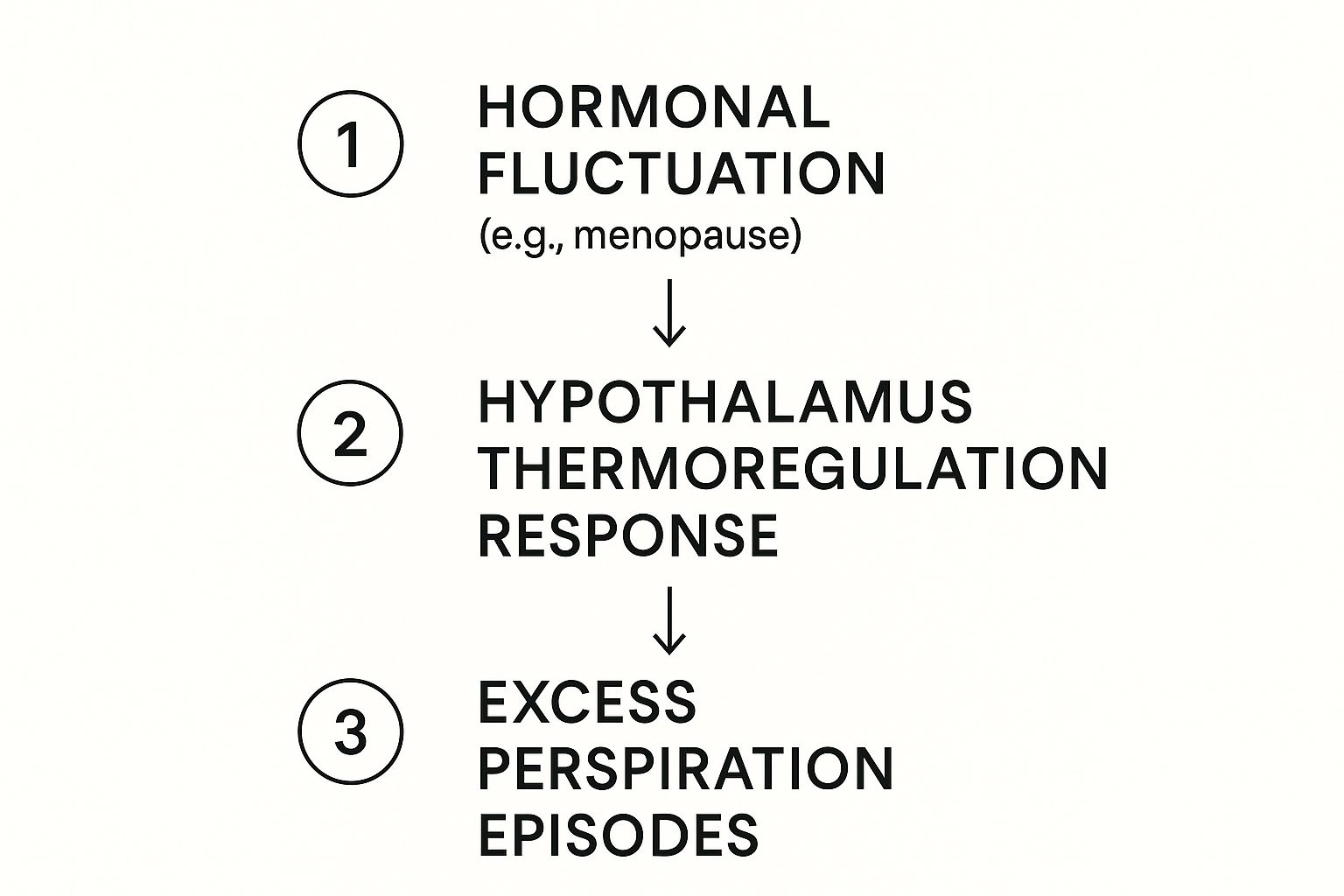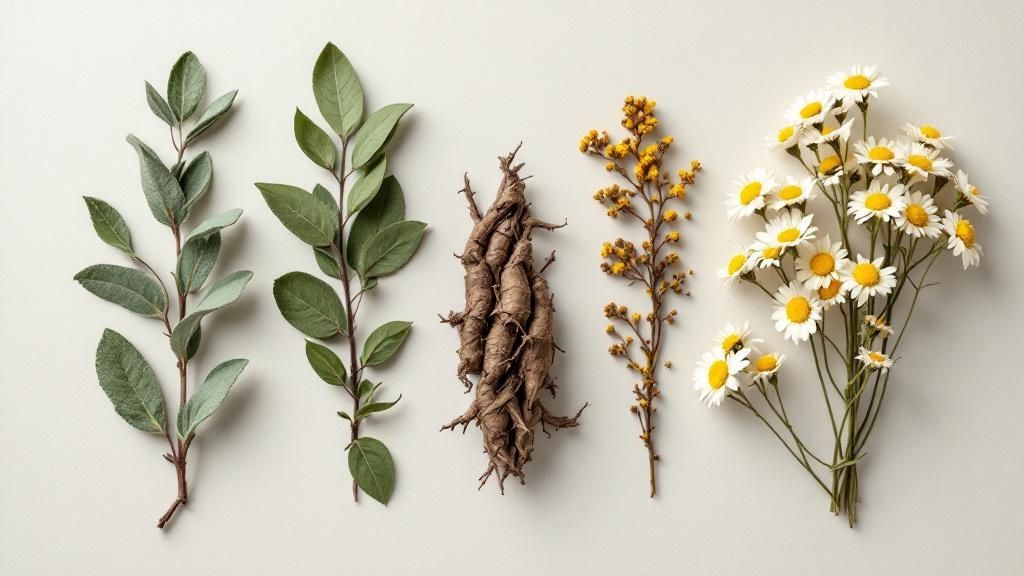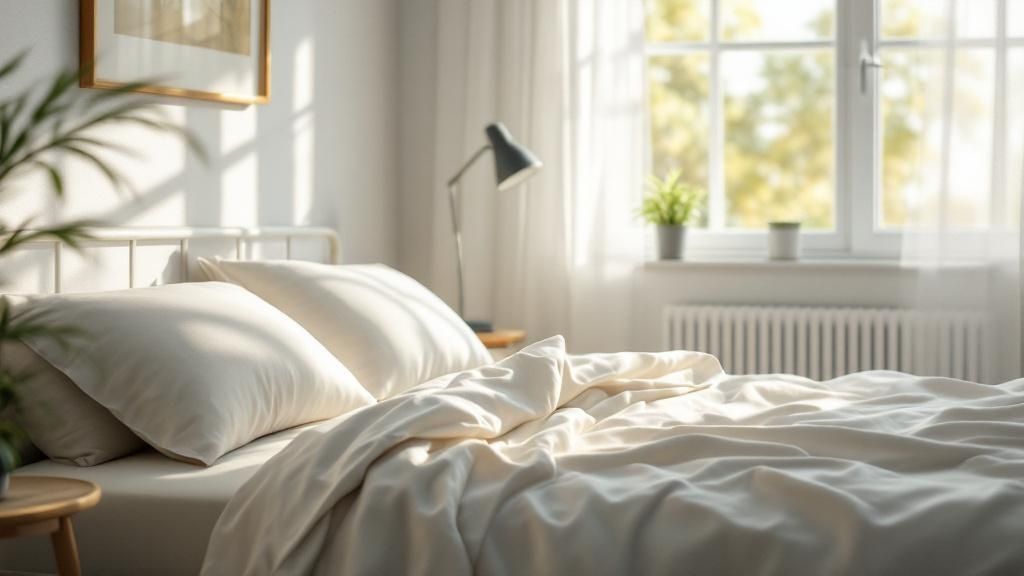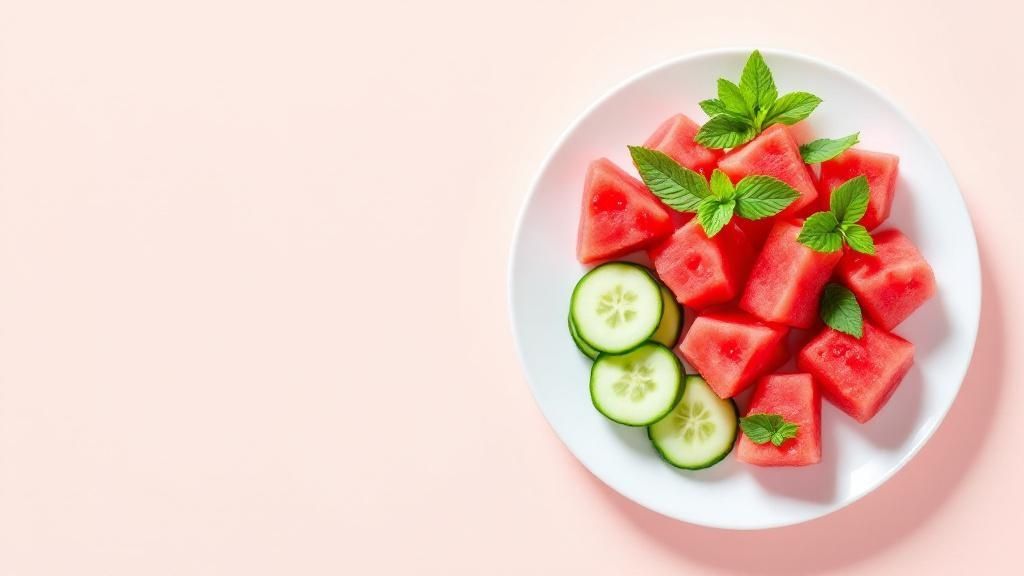If you're looking for a natural treatment for night sweats, the first thing to figure out is what's causing them in the first place. It's easy to jump to conclusions and assume it's hormonal, especially during menopause, but that's not always the full story. Stress, medications, and even what you eat can be the culprit, so a one-size-fits-all remedy just won't cut it.
Getting to the Bottom of Night Sweats
Waking up in a pool of sweat is your body’s way of sending up a flare. Something is off balance. Think of a night sweat as an intense hot flash that strikes while you’re asleep.
The whole process is run by your hypothalamus, which is basically your brain's internal thermostat. When it gets a false signal that you're overheating, it kicks your body's cooling system into high gear. Your blood vessels widen, and your sweat glands start working overtime to cool you down—fast.
For a lot of women, this internal thermostat gets thrown off during perimenopause and menopause. The real troublemaker here is fluctuating estrogen, which makes the hypothalamus super sensitive to even minor changes in body temperature. It's no wonder that an estimated 75% of menopausal women deal with hot flashes and night sweats.
But hormones aren't the only trigger. Your body's temperature can be thrown off by other things, too:
- Sky-high stress can flood your system with cortisol and adrenaline.
- Certain medications, like some antidepressants or diabetes drugs, are known to cause sweating.
- Your lifestyle choices, like having a glass of wine or a spicy meal too close to bedtime.
- Other health conditions that might need a doctor's attention.
The key to relief is finding your personal trigger. Once you know what’s causing your night sweats, you can pick a natural approach that gets to the root of the problem instead of just masking the symptom.
This kind of personalized thinking is why so many people are turning to complementary and alternative medicines (CAMs). As more people become cautious about traditional hormone replacement therapy, natural options have gained a lot of ground. A 2008 survey even found that over 40% of US adults had tried a CAM treatment in the past year, with women over 40 leading the charge. You can read more about the growing popularity of alternative therapies for menopause relief.
By pinpointing your unique cause, you put yourself in the best position to find a night sweats natural treatment that actually works for you.
Crafting Your Ideal Sleep Sanctuary
https://www.youtube.com/embed/pocRt2VDzgM
When you’re struggling with night sweats, your bedroom environment can either be your greatest ally or your worst enemy. Transforming your space into a cool, calm sanctuary is one of the most powerful and immediate steps you can take. You can start tonight.
Start with Your Sleep Setup
Let's begin with what's closest to you: your bedding. Heavy, synthetic fabrics like polyester are notorious for trapping heat, essentially creating a personal sauna while you sleep. The simple fix is to switch to materials celebrated for their breathability and moisture-wicking talents. Think lightweight cotton, airy linen, or even bamboo viscose.
These fabrics don't just feel better; they actively work to pull moisture away from your skin. To dive deeper into one of the best options, you can explore why bamboo sheets offer a cool and eco-friendly choice for hot sleepers.
Beyond the sheets, consider the room's overall climate. It might sound chilly, but sleep experts agree that the sweet spot for sleep temperature is between 60 and 67 degrees Fahrenheit (15-19°C). Even a simple fan can be a game-changer for air circulation. For more targeted relief, a cooling mattress pad or a specialized pillow can provide that cool-to-the-touch sensation right where it counts.
Master Your Pre-Sleep Ritual
What you do before your head hits the pillow is just as important as the pillow itself. A consistent, relaxing bedtime routine is like sending a clear signal to your body that it's time to power down and prepare for rest. This is especially vital when dealing with night sweats, which are often triggered by complex physiological signals.
The image below breaks down what's happening inside your body during these episodes.

As you can see, hormonal fluctuations can throw your brain's internal thermostat—the hypothalamus—into a state of confusion. This miscommunication is what directly leads to those drenching, sleep-disrupting sweats. Seeing this connection makes it obvious why avoiding certain triggers before bed can have such a profound impact.
Expert Tip: Think of it this way: by cooling your environment and calming your body, you're giving your internal thermostat a helping hand. You're proactively reducing the chances of it overreacting to those internal hormonal signals that cause you to overheat.
Here are a few quick changes you can make to your evening habits. Even small adjustments can bring significant relief.
Immediate Actions for a Cooler Night's Sleep
This simple checklist outlines some practical changes you can implement right away to help dial down the severity of your night sweats.
| Area of Focus | Actionable Tip | Why It Helps |
|---|---|---|
| Diet | Avoid spicy foods and heavy meals 2-3 hours before bed. | These foods can naturally increase your core body temperature, making you more prone to overheating. |
| Beverages | Skip alcohol and caffeine in the evening. | Alcohol disrupts sleep cycles later in the night, and caffeine is a stimulant that interferes with rest. |
| Exercise | Schedule intense workouts for the morning or afternoon. | Vigorous exercise raises body temperature; finishing your workout earlier gives your body time to cool down. |
| Environment | Set your thermostat to between 60-67°F (15-19°C). | A cool room supports your body's natural temperature drop, which is necessary for initiating sleep. |
| Bedding | Switch to breathable, natural fabrics like cotton, linen, or bamboo. | These materials allow air to circulate and wick moisture away from your skin, preventing heat buildup. |
By taking control of these simple factors, you put yourself back in the driver's seat. You’re no longer just reacting to night sweats; you’re actively creating the conditions for a dry, comfortable, and truly restorative night’s sleep.
Using Food and Hydration to Find Balance

It’s easy to forget, but what you put into your body has a direct line to its internal thermostat. Making a few strategic tweaks to your diet is one of the most practical ways to get a handle on night sweats, helping you cool your system from the inside out. This isn't about starting some miserable, restrictive diet—it’s about making smart, simple swaps.
A great place to start is by bringing more foods rich in phytoestrogens into your daily routine. These are completely natural, plant-based compounds that can gently mimic estrogen in the body. This is a huge help, as they can buffer the hormonal dips and spikes that often trigger those frustrating episodes of overheating at night.
Getting more phytoestrogens is easier than you think. Try adding foods like soybeans (think edamame or tofu), chickpeas, and flaxseeds to your meals. I often just sprinkle a tablespoon of ground flaxseed over my morning yogurt or oatmeal. It’s a tiny change that makes a real difference.
Foods That Help and Foods That Hurt
Just as adding certain foods can help, limiting others is equally important. Many common dietary culprits are known to crank up your internal heat. Sugary snacks, heavily processed foods, and too much caffeine can all throw your hormones out of whack and increase inflammation, which often makes night sweats worse.
Swapping a sugary afternoon snack for a handful of almonds and an apple isn't just a healthier choice—it's a conscious step toward better temperature regulation and a more restful night.
Here are a few easy food swaps you can try to help your body find its balance:
- Instead of white bread or pasta, choose whole grains like quinoa or brown rice. They have a much gentler effect on your blood sugar.
- Instead of sugary sodas or juices, make water your go-to drink. When you're sweating at night, hydration is absolutely non-negotiable.
- Instead of processed snack bars, grab whole foods like a handful of antioxidant-packed berries.
The Critical Role of Hydration
I can't overstate this: staying properly hydrated is fundamental to managing night sweats. When you sweat, you’re not just losing water—you’re losing crucial electrolytes, too. If you become dehydrated, your body has to work overtime to regulate its temperature, which can easily lead to even more intense sweating.
Try to sip water steadily all day long instead of chugging a huge amount right before bed. I find that keeping a reusable water bottle on my desk is the best reminder. By focusing on food and water first, you’re giving yourself a powerful and sustainable way to find balance and get some real relief.
Exploring Herbal Remedies and Supplements

When you’ve tweaked your diet and perfected your bedtime routine but still wake up drenched, it might be time to look at herbal remedies and supplements. Many people find that nature offers some powerful tools for managing night sweats, but it's smart to go in with a good understanding of what might actually work for you.
You've probably heard of black cohosh and red clover for menopausal symptoms. They both contain compounds that can mimic hormonal activity, which is why they sometimes help reduce night sweats. The thing is, their effectiveness is all over the map—what works for one person might not do much for another.
Promising Botanicals for Relief
One supplement that’s been getting a lot of attention, backed by some solid research, is evening primrose oil. It's packed with gamma-linolenic acid (GLA), a type of omega-6 fatty acid that can help calm inflammation and play a role in regulating hormonal pathways.
The science is pretty compelling. One clinical trial found that after eight weeks, a remarkable 27.5% of women taking evening primrose oil completely stopped having night sweats. For comparison, zero women in the placebo group had the same result. The study also highlighted a major drop in how often the sweats happened, showing it can tackle both severity and frequency. You can read the full research about these promising findings on PMC.
A few other herbs are also worth a look:
- Maca Root: This Peruvian root is an adaptogen, which means it helps your body adapt to stress and supports overall hormonal harmony.
- Dong Quai: Known in traditional Chinese medicine as the "female ginseng," it's been used for centuries to support women's health.
- Chasteberry (Vitex): This one is often turned to for its ability to help stabilize progesterone levels, a key factor for many in managing symptoms.
Finding the right herbal support is really about discovering what clicks with your unique body chemistry. It often takes a bit of patience and paying close attention to how you feel.
Choosing and Using Supplements Safely
Walking down the supplement aisle can feel pretty intimidating. The quality and strength of these products vary wildly from one brand to the next, so you have to be a savvy shopper. Always look for brands that are third-party tested by organizations like USP or NSF, which confirms you're getting what the label promises.
But before you start anything new, the most important step is to talk to your doctor. They can screen for any potential interactions with medications you’re already taking and make sure a particular supplement is safe for your health situation.
When you pair a well-chosen supplement with a sleep environment designed for coolness, like using cooling sheets for night sweats, you create a much stronger, more comprehensive plan for finally getting a dry, restful night's sleep.
Applying Mind-Body Practices for Stress Relief

When life gets stressful or anxiety creeps in, your body responds by releasing hormones like cortisol and adrenaline. This isn't just a mental state; it has real physical consequences, one of which is throwing your internal thermostat completely out of whack. It's this direct mind-body link that makes stress management a crucial part of any plan to tackle night sweats naturally.
Incorporating a few simple mind-body practices into your daily routine can help calm your nervous system down, preventing the hormonal spikes that lead to overheating at night. This isn’t about adding another chore to your day. It’s about finding small, manageable moments of calm that make a real difference.
Simple Breathing Exercises for Immediate Calm
One of the quickest ways to tell your brain "we're safe" is by controlling your breath. When we’re anxious, our breathing naturally becomes fast and shallow. By deliberately slowing it down, you can create a powerful physiological shift.
A fantastic, easy-to-remember technique is box breathing.
- Inhale slowly for four counts.
- Hold your breath for four counts.
- Exhale slowly for four counts.
- Hold again for four counts before repeating.
Just a few minutes of this before you get into bed can lower your heart rate and ease your body into a state of relaxation, paving the way for better sleep. This simple habit works even better when combined with other strategies for a restful night's sleep.
Integrating Mindfulness and Gentle Movement
Mindfulness is simply the act of being present without judgment. It doesn't have to be a formal meditation session (though it can be!). You can practice mindfulness while washing dishes—just focus completely on the feeling of the warm water on your hands and the smell of the soap. The whole point is to break the cycle of racing, anxious thoughts.
A consistent mindfulness or gentle yoga practice can help lower baseline cortisol levels over time. This means your body becomes less reactive to stressors, which can lead to a noticeable decrease in both the frequency and intensity of night sweats.
Gentle yoga and tai chi are also wonderful choices. These practices blend slow, mindful movements with focused breathing, creating a sort of moving meditation. They help you release the physical tension you might be holding in your shoulders or back while also soothing your mind, getting right at the root cause of stress-related overheating.
Common Questions About Finding Natural Relief
Dipping your toes into natural remedies for night sweats can feel like venturing into the unknown. It’s completely natural to have a bunch of questions pop up. What actually works? How long will it take? Getting some clear, straightforward answers can give you the confidence you need to find what works for you.
One of the first things everyone wants to know is, "How soon will I feel better?" The honest answer is: it really depends on the approach you take. Simple lifestyle tweaks, like turning down the thermostat or upgrading your bedding, can make a difference in your sleep quality almost immediately—we're talking within a few nights. Changes to your diet might take a little longer to show results, usually a few weeks as your body adjusts.
When you start exploring herbal remedies, you’ll need to play the long game. It typically takes a consistent 4 to 12 weeks of daily use before you'll notice a real drop in how often or how intense your night sweats are.
Combining Approaches and Staying Safe
I've found that the best results often come from attacking the problem from multiple angles. You can absolutely mix and match different natural strategies. For example, cleaning up your diet while starting a daily meditation practice can create a powerful synergy, making both efforts more effective.
However, you have to be smart about it, especially when it comes to combining herbal supplements. This is where a conversation with your doctor or a qualified healthcare provider is non-negotiable. They can help you avoid any nasty interactions between different herbs or between an herb and any medications you’re already on.
While botanicals are often safe, they aren't risk-free. Some herbal formulas can be incredibly effective—a 2019 study, for instance, found a specific blend led to a 69% reduction in night sweats over 12 weeks. But that same research flagged safety concerns with certain ingredients, like ashwagandha being linked to liver issues in rare cases. It’s always wise to discover more insights about these complementary therapies and understand why professional guidance is so important.
The real goal is to build a holistic plan that supports your body from every direction—your sleep space, your nutrition, and your mental state—while making sure safety is always the top priority.
When Is It Time to See a Doctor?
Natural remedies can be a game-changer, but they don't replace professional medical advice. You should definitely book an appointment with your doctor if your night sweats are so bad that they consistently wreck your sleep.
It's also crucial to get checked out if your night sweats come with other red-flag symptoms, such as:
- Unexplained weight loss
- A fever that won't go away
- Any unusual pain or discomfort
A doctor can run tests to rule out more serious underlying health issues that might be causing the sweating and require a completely different treatment plan.
For a truly restorative sleep experience, upgrade to Bamtek's 100% organic bamboo bedding, designed to keep you cool and comfortable all night long. Explore our collection of thermoregulating sheets and duvet covers at Bamtek.










